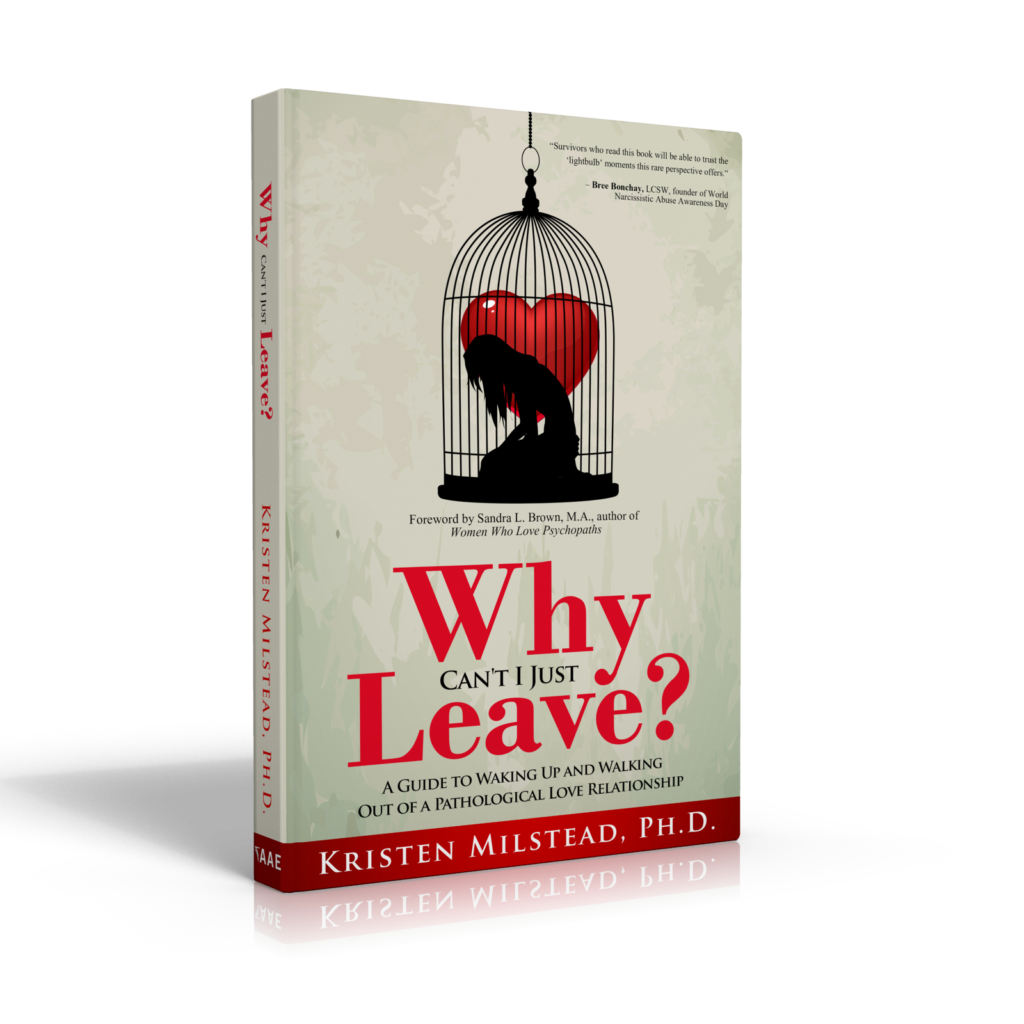If you are in a relationship with a narcissist, you’ve seen that moment when everything flips, when the narcissist plays the victim and you lose all sense of reality.
Why do we get to the point to where we can’t tell whether our own actions are the problem?
This is an idea that narcissists like to feed to their partners throughout the relationship after things start going downhill– and often to others outside of the relationship as well. [Read Mind Games Narcissists Play to Trick You into Blaming Yourself]
They will say things such as that their partners are emotional and argumentative; that they are jealous, suspicious, and accusatory; that they are moody, loving them one moment, and hating them the next; that they are untrustworthy; that they say mean things and are abusive.
And so the partner starts to wonder– is it my fault too?
Along with the thought comes the onslaught of confusion, guilt, shame, and a nagging sense that if they had only tried harder or done something in a different way, the entire relationship might have taken a different path or the narcissist would have finally started to treat them differently, to go back to treating them the way things were in the beginning.
These feelings the partner has about being at fault, however, are harmful to the recovery from the relationship so it’s important to dispel this notion and put responsibility where it lies.
How can we know that the partner is not to blame for what went wrong in the relationship?
There is a timeline and there are two parties.
The actions of both people lie along a continuum of time where what they were like before, during and after the relationship should be considered in order to understand what happened.
All of the blaming and shaming narcissists do to make the partner feel as if they destroyed the relationship themselves with their actions generally fails to take any of this context into account.
So let’s explore the idea of whether narcissists and their partners are “equally” to blame for the demise of the relationship.
We’ll start first with the narcissist:
- Typically has a pattern of overlapping relationships and/or cheating in his or her past.
- Makes claims that something is “wrong” with all or most of his or her exes (for example, that they cheated on him or her or they are somehow bad people in another way).
- Lies frequently to everyone about a variety of things from small to large. When caught lying about major things, they claim it is other people who are lying.
- Will provoke their partner intentionally or when the partner does something he or she doesn’t like, saying or doing something abusive or hurtful.
- Accuses their partner of cheating; stalks and investigates them without cause.
- Words and actions frequently do not match up, e.g., as per #2, will claim exes have victimized them but may still interact frequently with several of them.
- Will run smear campaigns behind the partner’s back.
- Proceeds directly into a new relationship as soon as this one ends or even before it ends.
- Does not think anything is wrong with them or make real attempts at change.
Now let’s examine the partner’s behavior, and compare and contrast it with that of the narcissist:
- Generally has no relationship pattern (e.g., some have fallen into a pattern of dating narcissists, some have had healthy relationships in the past, some have had problematic but non-narcissistic relationships, some have not had a relationship).
- Generally, do not define their exes in patterned ways. Again, this is not to say that they never had problematic relationships in the past, but there is a lack of a “pattern” among partners, or more importantly, how partners describe them.
- May start to lie to the narcissist only if the narcissist gets upset easily later in the relationship. This is a form of “walking on eggshells” used because it may become easier to lie about minor things to avoid being verbally attacked.
- When provoked or abused, may say or do something hurtful in response to strike back.
- If the narcissist has purposely tried to make the partner jealous or been caught cheating, the partner may start investigating things the narcissist has said or done, and then confront him or her about what was found.
- Due to not knowing whether the narcissist is trustworthy or not, will become confused and change his or her demeanor around the narcissist depending on recent events (sometimes fearful, sometimes angry, sometimes loving, etc.)
- Will often defend the narcissist when he or she is not around and hide the abusive behavior to try to help justify to others why he or she is staying in the relationship.
- Usually stays single immediately following the relationship to process what happened, heal and ensure that what happened doesn’t occur again in future relationships.
- Speculates on how he or she may need to change or grow because of what happened in the relationship.
During the relationship, there are some similarities in the behaviors of the narcissists and their partners.
Narcissists and their partners may both lie. [Read 7 Narcissist Lies That Are Easy to Spot]
They may both say or do mean or vicious things.
They may both act jealous and check up on the other.
They both may be ambivalent, acting one way one minute and another the next, or saying one thing and doing another.
These similarities are what narcissists are able to exploit to their advantage. When their partners engage in this behavior, here are a few things narcissists can then do:
- Deflect the blame from themselves for the things they are doing so they don’t have to feel bad, discuss them, or make amends
- Use it as an example of why they are justified for doing something they did or to engage in further abusive behavior
- Use it to manipulate the partner into trying to win back the narcissist’s affections to make amends
- Gaslight the partner into believing he or she deserved what happened
- Gaslight the partner into thinking they’re the one with the problem
- Hook the partner into staying in the relationship longer by confusing who is at fault
- Use it to show others how the partner is to blame for issues in the relationship or a break-up or to justify why the narcissist has another partner or is jumping into another relationship so soon
- Use it to get a potential new partner to feel sorry for them by explaining how they are being mistreated
There are some important distinctions that must be examined in order to illuminate the true repercussions of the relationship for each party.
Partners try not to recreate and repeat a relationship like this one again. It is the person who hasn’t been damaged by it, the narcissist, who keeps repeating the same pattern again and again and who moves on quickly after the relationship in question to continue it.
In fact, not only were they not damaged by it, they benefited from the arrangement, even though they may have claimed to be victimized by it. Claiming to be victimized may be one way they may have increased the benefits!
Despite the similarities, there is a very important difference between how the narcissist and his or her partner behaves in the relationship and it cannot be understated.
The partner behaves in this manner only as a reaction to behavior engaged in by the narcissist. In contrast, the narcissist’s behavior is a certainty, regardless of the actions of the partner– positive, negative, or neutral.
In other words, first, the narcissist engages in actions that are inherent in being a narcissist, those actions subsequently cause devastating harm to the partner, and as a result, the partner reacts to it.
If it weren’t for the actions of the narcissist, the actions of the partner that the narcissist is complaining about wouldn’t even exist. This is true regardless of whether the complaints are real or whether they exist only to serve some of the functions listed above.
Yet no matter what the partner does or doesn’t do in the relationship, there is nothing that he can do to change the trajectory of the relationship as it hurtles toward its inevitable and predictable end.
But let’s stop and think about what else the narcissist is doing for a moment.
It is not only that the narcissist perpetrates a harmful act on his victim, it’s also as if he then holds up a mirror afterward to infinitely reflect back his own painful action to try to make the partner and everyone else believe that the partner herself is the one who caused it, hence increasing exponentially the amount of pain the partner feels. It’s an added act of pure cruelty.
In summary, partners of narcissists cannot be equally at fault for the demise of a relationship when their behavior was manufactured by the person claiming they are at fault. That doesn’t even make sense.
Have you done things that were out of character, things that you wish you hadn’t done? Have you lost your ability to control your emotions? Did you feel helpless and hopeless and act out of desperation?
There is a difference between blaming yourself for the failure of the relationship and taking responsibility for things you may have done that you would take back if you could. Try to forgive yourself, and recognize that most people in your position would have done what you did or something else similar. [Read 10 Things I Would Tell My Narcissist Ex If I Could]
Forgiving yourself is how you treat yourself with the kindness that your partner didn’t. It’s the way you prove to yourself that you’re worth more than what he or she tried to make you believe.
The relationship could not have unfolded any other way.
When you realize there is nothing you could have done differently, recognizing you couldn’t save the relationship is more powerful than recognizing you didn’t kill it.






7 Comments
Carly
I am currently getting out of a 10 year relationship with a narcissist and it took a therapist to confirm that I did everything I possibly could to save my relationship with the father of my children. No stone was unturned and I worked on fixing myself for so long that I had started to at least see that I wasn’t the problem. Thank you for this post. Your blog is helping me so much.
Margaret
The last two lines resonate with me- so true.
Currently being humiliated by having a new supply displayed in front of me.
Kristen Milstead
Hi Karen: I’m so glad to hear that you were able to get out of your relationship. Walking on eggshells is no way to live. I hope you are doing well now on your path to recovery. Thank you for taking the time to leave a comment. -Kristen
KAREN YOUNG
Great read, especially the last two lines.
I did finally decide, however, that I had to forgive myself and treat myself with the kindness he didn’t.
There was nothing I did to kill the relationship, just as there was nothing I could have done to save it.
After 19 years, the last five especially, dealing with this toxic relationship I finally felt I could walk on eggshells no longer and not wanting to go to my own home to deal with him was my final eye opener.
despair2deliverance
Thank you for your response, Kristen. I think I’ve decided to call what I was in a “regime,” not a relationship. I accepted it and lived under it until I just couldn’t do that any longer. I continue to read your insightful posts with great interest. Cheers!
despair2deliverance
I have read and re-read this post … I don’t know how many times. I just keep coming back to it because something here really resonates with me. I think I’ve always been a person who puts strong faith in the fact that we can all “control our own destiny,” or “pull ourselves up by our own bootstraps.” What I read here gives me a sense of something deterministic at work. For instance, “I don’t use this logic to absolve myself of wrongdoing, nor do I take the blame for why this relationship went awry because it is clear that it could not have unfolded any other way.” And this statement: “There was nothing I did to kill the relationship, just as there was nothing I could have done to save it.”
I didn’t like how I felt when I read that for the first time. I’ve always liked to think my decisions, reactions, and responses would have had some effect, good or bad, and that if I only could make good decisions, that would lead to some kind of improvement, or at least a rapprôchement. I was wrong. This post captures precisely how I feel now. I officially ended a 22-year relationship on January 26. I feel there was no other way … because I did “nothing to kill the relationship, and there was nothing I could have done to save it.”
Kristen Milstead
Thank you for your insightful comments. You are very fresh off of having ended a relationship that you were in for a very, very long time, and you must feel very overwhelmed. I remember feeling so exasperated and also helpless for months, in disbelief that if I loved him, there was nothing I could do to change what was happening. There seemed to be some disconnect and I couldn’t figure out why it wouldn’t work out. If only he would listen. If only he would stop doing x. If only he would be the man he’d been at the beginning. If only he would be the man (I thought I knew) he could be. Etc.
In fact, I write that sentence about there being nothing I could do in what may seem to be a cavalier manner, but it was more of an acceptance statement after months, and technically years now of distance of processing and pondering endings. I finally realized that it was inevitable from the beginning. The reason why I believe this now is because if he was only presenting me with a persona he created so I would fall in love with him, then that means I fell in love with a lie and the person I fell in love with doesn’t exist. If loved me only because I loved him and not for me as a person, then I was bound to fall off the pedestal when he stopped idealizing me because he would begin to see my flaws or perceive my being my own person and having my own opinions and desires as a criticism of him.
There is more I could write here to demonstrate what I mean about why there was nothing I could have done about narcissists lacking conscience and ability to form attachments, but hopefully, I have given you an idea of what I mean. When one person bases the relationship on values that are one-sided, it’s not sustainable because, it defies the very definition of “relationship.” What that person is doing is extracting from you and not trying to have a relationship in the true sense of the word. It took me years to finally accept that this was the truth.
Thank you again for your comments, and thank you for reading.